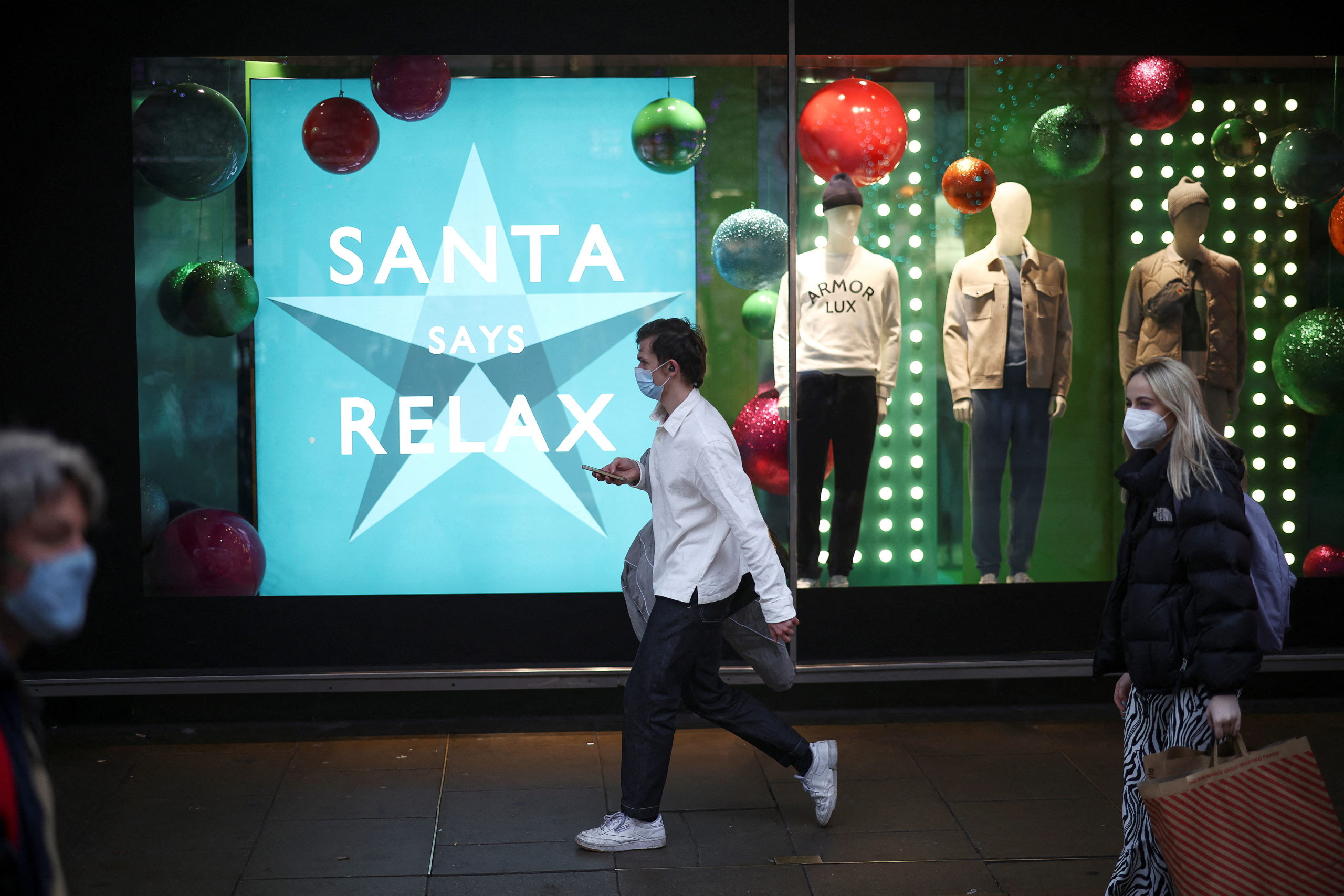Vaccines, pills, data offer some Christmas cheer in face of Omicron advance

People walk past a Christmas shop display on Oxford Street, amid the coronavirus disease (COVID-19) outbreak in London, Britain, December 23, 2021. REUTERS/Henry Nicholls
JOHANNESBURG/LONDON — Omicron advanced across the world on Thursday, with health experts warning the battle against the COVID-19 variant was far from over despite two drugmakers saying their vaccines protected against it and signs it carries a lower risk of hospitalisation.
Coronavirus infections have soared wherever the highly infectious Omicron variant has spread, triggering new restrictions in many countries and record new cases.
But in another glimmer of hope two days before Christmas, a U.S. Federal Drug Administration official said that data indicated that both Merck’s and Pfizer’s COVID-19 anti-virals are effective against the coronavirus variant.
There were encouraging signs too about hospitalisation rates from Britain and South Africa, although the head of a leading African health agency joined the World Health Organization in cautioning that it was too soon to draw broader conclusions.
“Let’s be careful not to extrapolate what we are seeing in South Africa across the continent, or across the world,” Africa Centres for Disease Control (CDC) chief John Nkengasong said.
Article continues after this advertisementNevertheless, U.S. stock indexes and yields on U.S. Treasuries both climbed on Thursday, partly on new optimism.
Article continues after this advertisement“Today is a very calm day. It’s the relief over Omicron apparently not being as bad as we feared,” Ryan Detrick, chief market strategist at LPL Financial, said.
First identified last month in southern Africa and Hong Kong, Omicron is becoming dominant in much of Europe including Britain, where daily new infections have soared beyond 100,000.
In France, daily coronavirus cases – currently close to 90,000 – could rise into the hundreds of thousands in January, a scientific adviser to President Emmanuel Macron said on Thursday, while Germany reported its first Omicron death and Serbia reported its first Omicron case.
In Italy, the first Western country to be hit by the pandemic last year, the National Health Institute said Omicron would soon predominate, while Greece banned public Christmas festivities to curb its spread. Both countries also made outdoor mask-wearing mandatory.
But increases in hospitalisations and deaths in South Africa and Britain since Omicron took hold appear to have been only gradual, and AstraZeneca and Novavax joined other manufacturers in saying their shots protect against it.
University of Edinburgh researchers who tracked 22,205 Omicron patients said on Wednesday the number who needed to be hospitalised was 68% lower than they would have expected, based on the rate in patients with Delta.
Imperial College London researchers reported evidence of a comparable 40%-45% reduction in hospitalisation risk.
Britain recorded a record number of new coronavirus cases on Thursday as Omicron swept the country, with the daily tally reaching 119,789 from 106,122 a day earlier.
But analysis of preliminary data by the UK Health Security Agency showed an individual with Omicron was estimated to be between 31% and 45% less likely to attend hospital compared to someone with Delta, and 50% to 70% less likely to be admitted.
UKHSA boss Jenny Harries said this was “an encouraging early signal”, but added: “this is early data and more research is required to confirm these findings”.
The U.S. Food and Drug Administration authorised Merck’s anti-viral pill for certain high-risk adult patients, a day after giving the go-ahead to a similar treatment from Pfizer.
Both pills worked, a top FDA official said.
“The available data that we have indicates that both paxlovid and molnupiravir are effective against Omicron,” said Patrizia Cavazzoni, adding that both interfere with how the virus replicates, a process that is not altered across variants.
‘Don’t over-interpret’
Raghib Ali, senior clinical research associate at the University of Cambridge, said scientists had warned that, with the surge in cases in Britain, even a small proportion of hospitalisations could overwhelm the healthcare system.
The British data supported findings from South Africa’s National Institute for Communicable Diseases (NICD).
A separate South African government-backed study, yet to be peer-reviewed, on health workers given the Johnson & Johnson vaccine identified “clear and early de-coupling” of hospitalisation from Omicron cases compared with Delta.
However, the CDC’s Nkengasong said the NICD data, suggesting Omicron was 70%-80% less severe than Delta, should be interpreted “with a lot of caution”.
AstraZeneca said a three-course dose of its vaccine offered protection against the variant, citing data from an Oxford University lab study.
Findings from the study, yet to be published in a peer-reviewed medical journal, matched those from rivals Pfizer-BioNTech, and Moderna.
Hours earlier, Novavax said early data showed its vaccine – authorised for use by the European Union and WHO but yet to be approved by the United States – also generated an immune response against Omicron.
But the older Delta variant lurks.
The coronavirus death toll in Russia, where officials had detected only 41 Omicron cases, passed 600,000 on Thursday, Reuters calculations based on official data showed, after a surge of Delta-linked infections.
Only the United States and Brazil have recorded more coronavirus deaths.
For more news about the novel coronavirus click here.
What you need to know about Coronavirus.
For more information on COVID-19, call the DOH Hotline: (02) 86517800 local 1149/1150.
The Inquirer Foundation supports our healthcare frontliners and is still accepting cash donations to be deposited at Banco de Oro (BDO) current account #007960018860 or donate through PayMaya using this link.